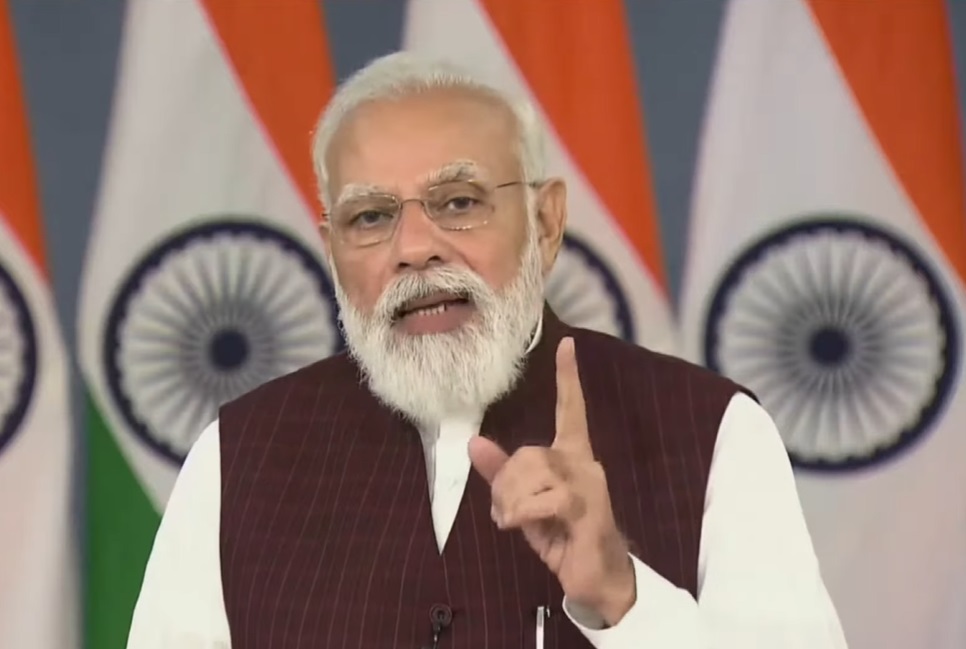New Delhi, 13 October: Launching the Rs 100 lakh crore National Master Plan for Multi-Modal Connectivity on Wednesday, Prime Minister Narendra Modi said that today the foundation of India of the next 25 years is being laid with the resolve of a self-reliant India.
He said that this National Master Plan will give Gati (Gati Shakti) to 21st century India.
The Prime Minister also inaugurated hall numbers 2 to 5 in the new exhibition complex at Pragati Maidan at the inaugural function held at Pragati Maidan.
During this, he said that PM Gati Shakti has targeted to cut logistic cost, increase cargo handling capacity and reduce turnaround time.
He said that the objective of the scheme is to give more power and speed to the projects by connecting all the concerned departments on a single platform.
He pointed out that the infrastructure schemes of various ministries and state governments would be designed and implemented with a common vision.
Modi stressed that the people of India, the Indian industry, the business world of India, the Indian manufacturers and the farmers of India are at the heart of this great campaign of dynamism. It will give new energy to the present and future generations of India to build India of the 21st century and remove the obstacles that come in their way.
The Prime Minister said that over the years the ‘Work in Progress’ board has become a symbol of lack of confidence.
He said that earlier government officials used to put up ‘work in progress’ boards and the work used to hang.
Modi said that due to this negligence, the project used to take a long time to complete and money was also misused.
He said that progress requires speed, eagerness and collective efforts. He said that today’s 21st century India is leaving behind the old systems and practices.
He stated that today’s mantra is desire for progress, work for progress, money for progress, plan for progress and priority for progress.
He said that we have not only developed a work culture of completing the projects within the stipulated time frame, but now efforts are being made to complete the projects ahead of time.
The Prime Minister lamented the fact that the subject of infrastructure in the country has not been a priority for most political parties. It is not even visible in his manifesto. Now the situation has become such that some political parties have started criticizing the creation of necessary infrastructure for the country.
The Prime Minister said that the wide gap between macro planning and micro implementation is leading to lack of coordination, lack of advance information, thinking and working in silos, hampering construction and wasting budget.
He said that power is divided rather than multiplied or increased. PM Gati Shakti National Master Plan will address this as working on the basis of master plan will lead to optimum utilization of resources.
Recalling the time when he took over as the Prime Minister in 2014, he said that hundreds of stalled projects were reviewed and put all the projects on one platform and tried to remove the bottlenecks.
He expressed satisfaction that the focus is now on avoiding delays due to lack of coordination.
He said that the PM Gatishakti Master Plan not only brings together the various stakeholders involved in the government process, it also helps to integrate different modes of transportation. It is an extension of holistic governance.
The Prime Minister elaborated on the steps taken to accelerate the pace of infrastructure development in India.
He said that the first interstate natural gas pipeline in India was commissioned in 1987. After this, 15,000 km long natural gas pipeline was built in 27 years till 2014. Today, work is underway on a gas pipeline of more than 16,000 km across the country.
He said that a target has been set to complete this work in the next 5-6 years.
He said that in the five years before 2014, only 1900 km of railway lines were doubling. In the last 7 years, we have doubled more than 9 thousand kilometers of railway lines. In the 5 years before 2014, only 3000 km of railways was electrified. In the last 7 years, we have electrified more than 24 thousand kilometers of railway tracks.
The Prime Minister said that before 2014, the Metro was running on only about 250 km of track. Today the metro has been expanded up to 700 km and work is going on on a thousand km new metro route. In the five years before 2014, only 60 panchayats could be connected with optical fiber. In the last 7 years, we have connected more than 1.5 lakh gram panchayats with optical fiber.





